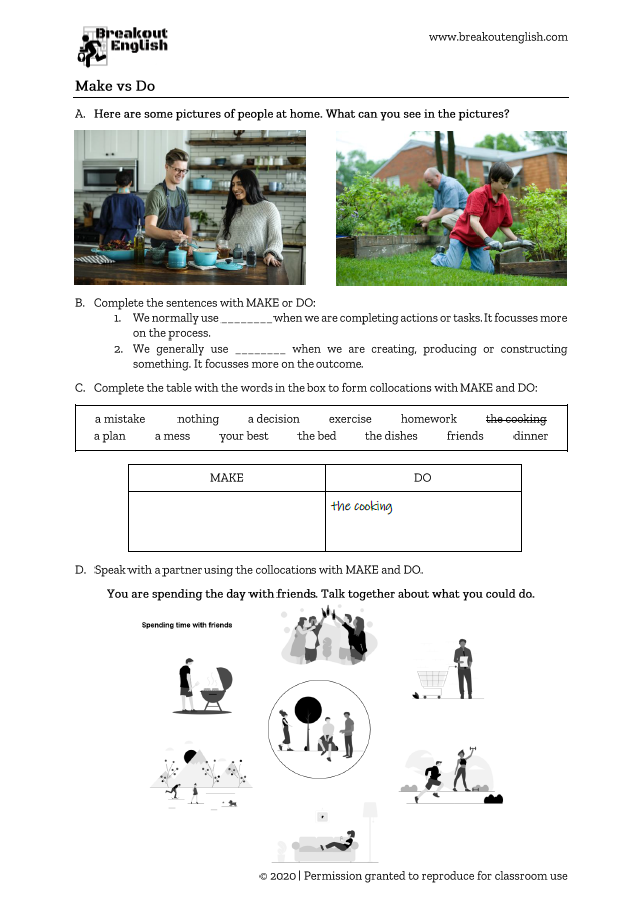Make and do are notoriously difficult for learners of English to distinguish. There is a subtle difference in meaning, but it’s the exceptions and collocations that drive people crazy. Check out the explanation and download the tasks to use in class or study at home.
This language is key at B1 level. You’ll see plenty of opportunity to use make and do in speaking and writing if you’re doing a Preliminary (PET) or ISE I exam. Learn some of the more difficult collocations and you’ll really impress the examiner. But don’t worry if you occasionally get one wrong. Make and do are verbs which people have trouble with even at higher levels!
Contents
Make vs do meaning
Make and do seem similar, but they have different meanings.
Make is normally used to describe creating, producing or constructing something. It focuses on the outcome of the task. For example, make a plan is giving attention to the plan more than the process.
Do is associated with the completing an action or task. It focuses on the process. For example, do exercise is all about the process, not the final result.
Make and do collocations
Here are 62 common collocations with make and do. We’ve separated them into categories because who doesn’t love categories?
Make

Food and drink
- make breakfast / lunch / dinner
- make a cup of tea / coffee
- make a sandwich
- make a salad
- make cookies / cupcakes / brownies
- make dessert
- make a cake
Communication
- make noise
- make a sound
- make a suggestion
- make a complaint
- make an excuse
- make a point
- make a prediction
- make a phone call
- make an observation
- make a mistake / an error
- make a fuss
Plans and decisions
- make plans
- make a decision
- make a choice
- make arrangements
- make an appointment
- make a reservation
- make a promise
Money
- make money
- make a profit
- make a loss
- make a fortune
- make an investment
Other
- make the bed
- make a difference
- make a mess
- make friends
Do

Housework
- do chores
- do the dishes / washing-up
- do the ironing
- do the shopping
- do the washing / laundry
- do the cooking
Non-specific activities
- do something
- do nothing
- do anything
- do the right thing
- do good
- do well
- do badly
- do your best
Jobs and tasks
- do homework
- do a good job
- do overtime
- do a crossword
- do a course
- do your duty
- do an exam
- do an activity
- do paperwork
- do business
- do research
Sports and activities
- do exercise
- do yoga
- do gymnastics
- do karate
The materials
If you are teaching make and do in class, it’s important to not overwhelm your students. Nobody can remember 62 collocations in one go! With these tasks, you can teach the meaning and collocations. Some of the tasks have been designed in the style of the Preliminary (PET) exam.
Use the list either before or after the task as a self-study tool. After doing this vocabulary, don’t forget to recycle the collocations back into your lessons regularly until they stick. Pictionary, charades, taboo, kahoot or any word game is a great way to practise make and do.
EXAM PART: Use of English, Writing, Speaking
EXAM SKILLS: Using a range of appropriate vocabulary for everyday situations
TIME: 20-30 minutes
PREPARATION: One copy of the worksheet per student
Download







